How to grill
Firing up the grill is one of the best ways to enjoy warmer weather. But you should make sure you are doing what you can to use it safely. Here’s what experts want you to know about how to grill food in safe and healthy ways.
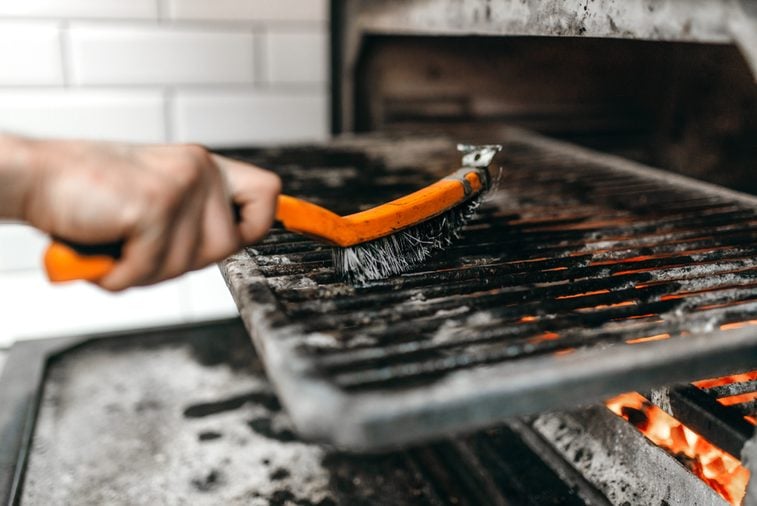
Don’t assume your grill is ready to go
One of the rules for a healthy grilling season is prep. If your grill has been sitting, it’s a good idea to check it before lighting it up. “Failing to properly clean the grill or having the grill too close to something that could burn are the leading causes of fires,” says Lorraine Carli, vice president of Outreach and Advocacy for the National Fire Protection Association. Home chefs should also check for any damage before using the grill for the first time each year, and to check the entire grill regularly.” From 2012 to 2016, an average of 16,600 patients per year was taken to emergency rooms because of injuries involving grills.
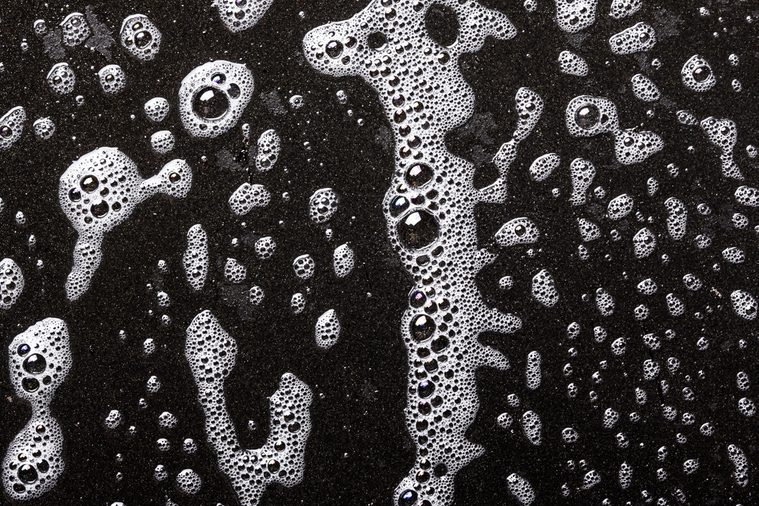
Check your hoses
According to the National Fire Protection Association (NFPA), fire departments were called to an average of 9,600 home fires involving grills, hibachis, or barbecues per year from 2011 to 2015. The NFPA recommends applying a soap and water solution to hoses to check for gas leaks. If a leak exists, bubbles will form. Turn off the grill and close the tank. If the leak stops, you may simply need a grill service. If the leak continues, call the fire department immediately.
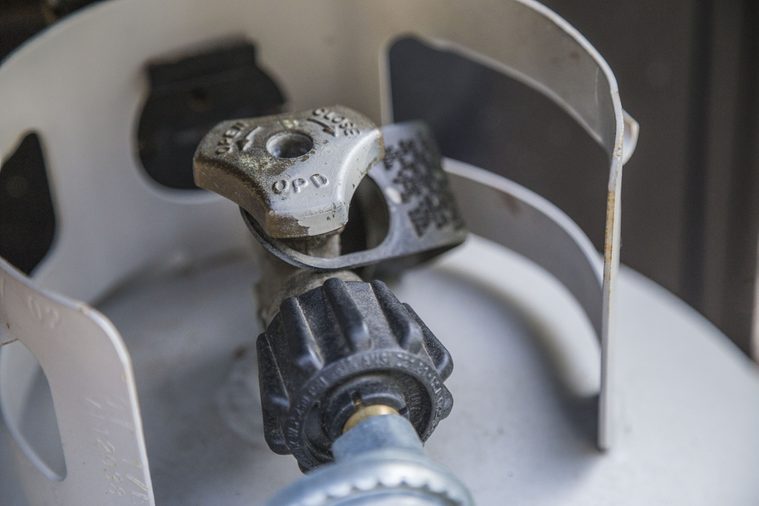
Check your gas tank
Your guests are all lined up waiting for that juicy burger and your flames die out because you forgot to check the tank for adequate gas. While taking your tank to be refilled, check that it’s still qualified for use. Guidance from the Pipeline and Hazardous Materials Safety Administration suggests that propane tanks be re-qualified or replaced every 5 to 10 years. Dates are indicated around the top and neck of the cylinder tank. And regardless of the date, if your tank shows signs of rusting, dents, bulging, cracks, or faulty valves, you’ll need a new one.
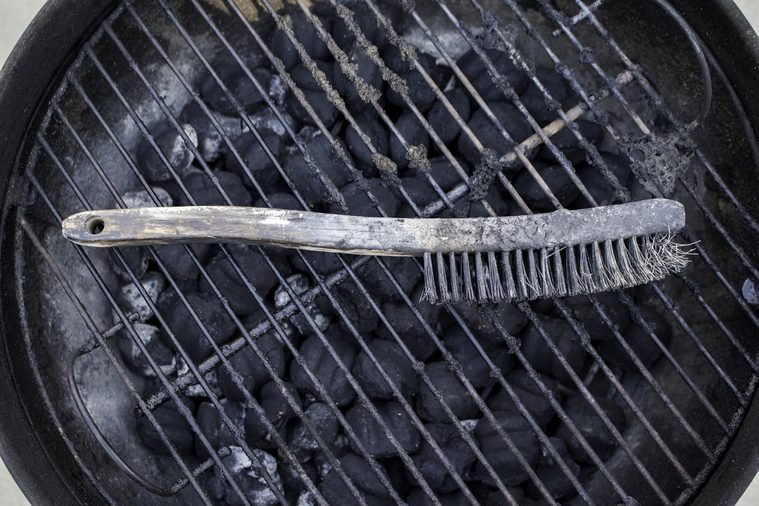
Use a new grill brush
If you’ve been scrubbing the grill grates with the same old grill brush for years without a second thought, it’s probably time for a new one. Wire grill brushes resulted in about 1,700 injuries—including swallowing the bristles—between 2002 and 2014, according to a 2016 article in the Journal Otolaryngology-Head and Neck Surgery. The researchers looked at reports to the Consumer Product Safety Commission’s website saferproducts.gov and estimated that nearly 70 percent of injuries resulted in a trip to the emergency room. Before using last year’s grill brush, check for loose bristles, then wipe the grates down thoroughly after using the brush. Check with your grill manufacturer to make sure you’re using the right brush type for your grill.
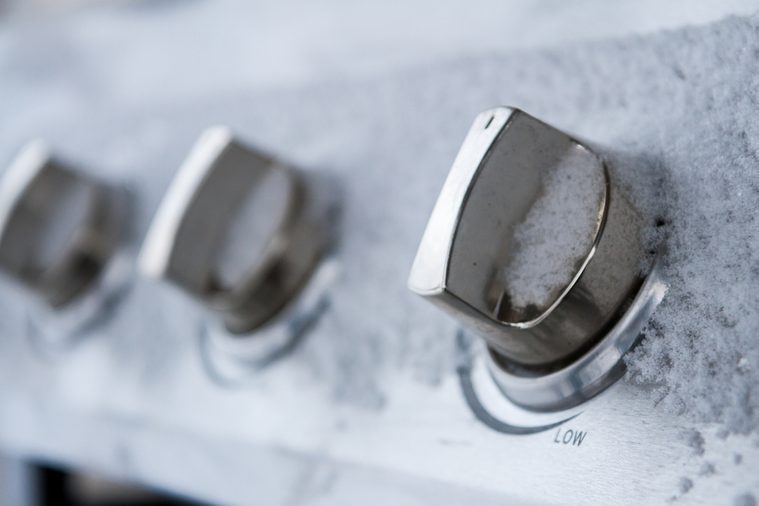
Preheat long enough
A grill (charcoal or gas) needs to preheat for about 15 minutes till the temperature reaches around 500 degrees, according to Weber’s Tips and Tricks for Grilling Success. Preheating your grill gets the grate hot enough to sear properly and helps prevent food from sticking. It also helps burn off extra bits of food left on the grate, so it’s easier to clean. (These are the cooking mistakes that can make your food toxic.)
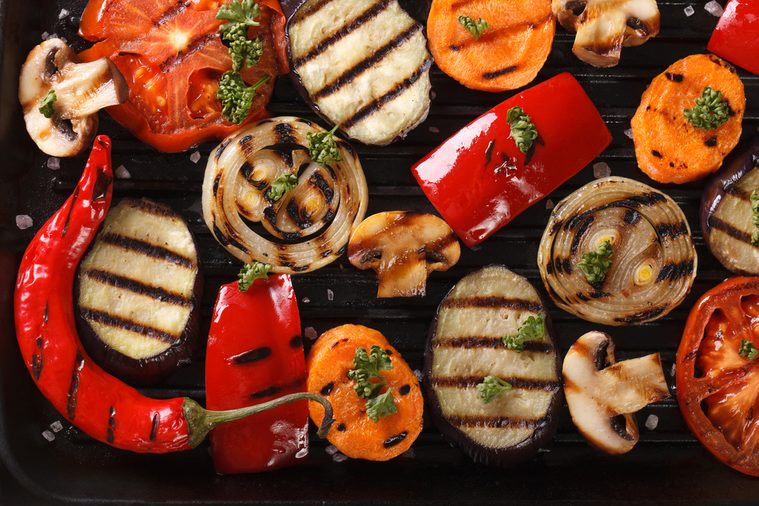
Grill foods other than meat
Get the biggest bang for your grill buck by following healthy grill recipes and throwing other parts of the meal on as well. “Use your grill to its full advantage and grill veggies and fruits too,” says registered dietitian Sandra J. Arevalo, spokesperson for the American Dietetic Association. “Marinate vegetables in olive oil, balsamic vinegar or lemon juice, and sea salt before grilling. Sliced eggplant, open sweet peppers, mushrooms, asparagus, sliced zucchini, and corn can be grilled right on top of the rack. You can also add chunks of onions, tomatoes, and pineapple to your meat skewers.” For dessert,” she adds, “try grilling sliced bananas, peaches, pears, and mangoes.”
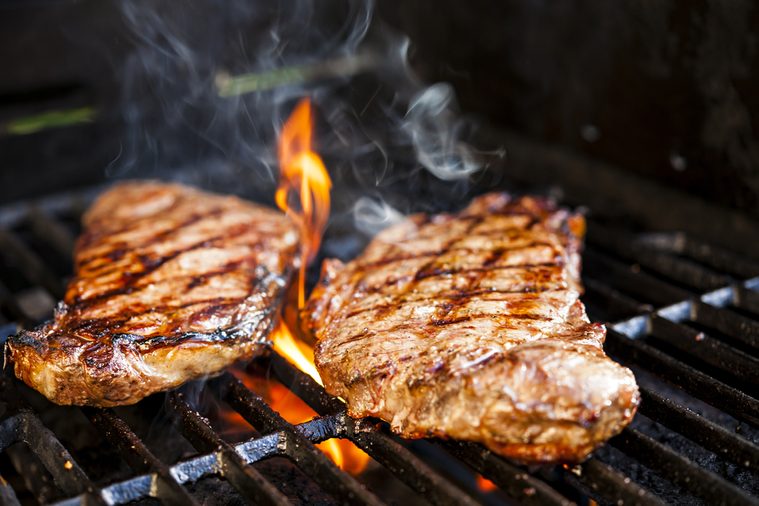
Use the right cooking method
According to Weber’s Grilling Guide, there are two types of grilling methods, direct and indirect. Use the direct method, which is closer to the heat source, for foods that take fewer than 25 minutes to cook, like steaks, chops, kabobs, sausages, and vegetables. The indirect method, where food is farther from the heat source, is better for foods that require 25 minutes or more of grilling time, like a whole chicken, or for foods such as white fish that are so delicate that direct exposure to the heat source would dry them out or scorch them.
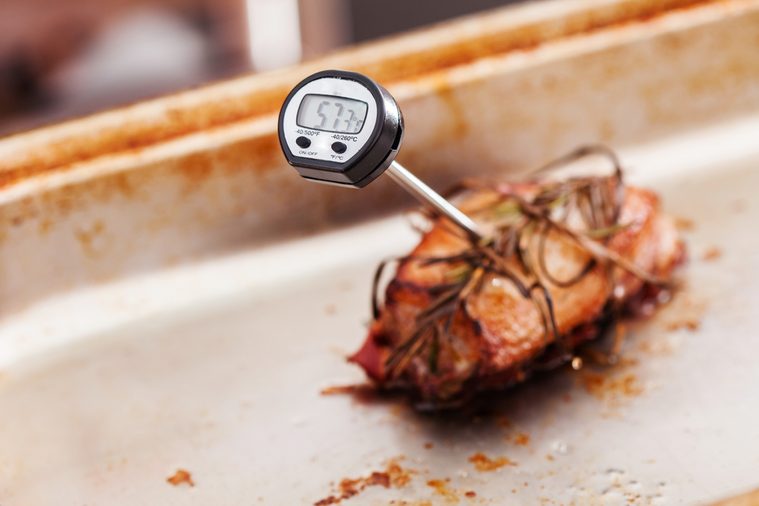
Use a food thermometer
Archie Magoulas, food safety specialist at the meat and poultry hotline at USDA, says a food thermometer is essential for safe grilling. Ground meat should be cooked to 160 degrees, poultry to 165 degrees, and red meat to 145 degrees, per the USDA. If you’re wondering why a sirloin burger needs to be cooked to a higher temperature than a sirloin steak, Magoulas says the grinding process can transfer bacteria from the outside of the meat to the inside. “Don’t let the color fool you, your burger may look brown throughout, but it may not have reached 160 degrees,” he warns.
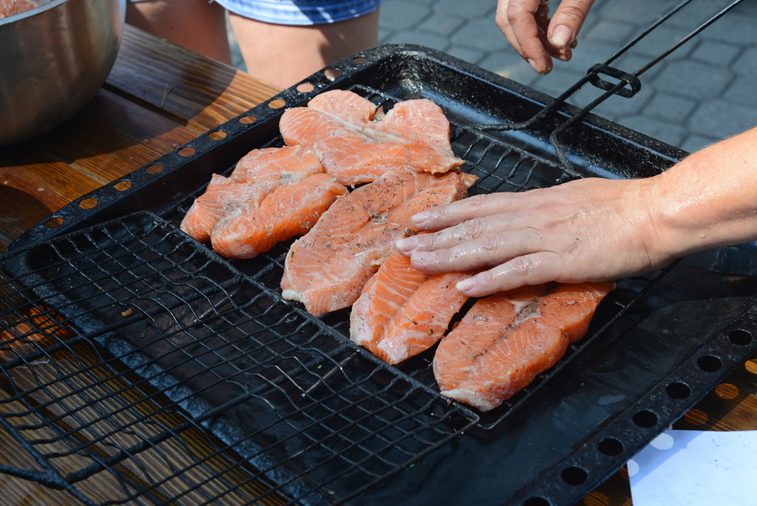
Separate cooked and uncooked
Your burgers are just about done and now you’re throwing some raw marinated chicken on the grill right next to them. Food poisoning experts say that’s a bad idea. “Cross-contamination can easily occur from bacteria such as E. coli, campylobacter, or salmonella,” says Magoulas. Instead, he suggests, “Cook meat and poultry in batches until cooked through, remove them from the grill; then add the next batch of uncooked.” He also says to make sure to wash your hands after handling any raw items, so you don’t transfer bacteria to your hamburger buns and burger toppings for example. (Don’t miss summer food safety rules to avoid food poisoning.)
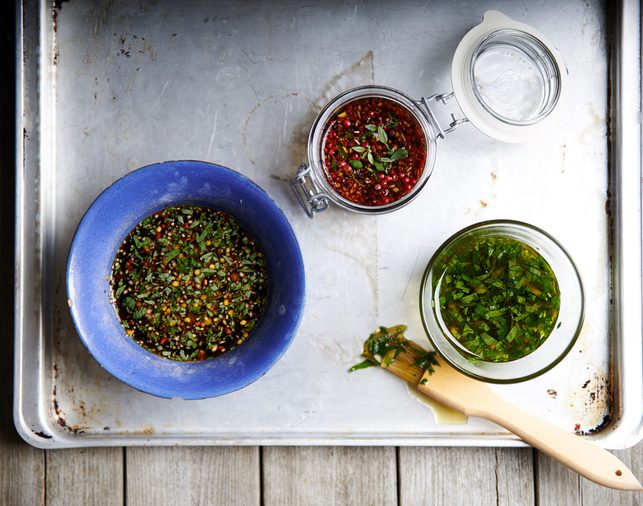
Don’t re-use a marinade or sauce
“Foodborne illness peaks in summer months as bacteria thrive in warmer climates,” Magoulas says. Sneezing or touching your food can transfer bacteria such as Staphylococcus aureus to your meal. So that sauce or marinade that you’ve brushed on your steak, ribs, or chicken could be a breeding ground for bacteria. Even if you reheat the leftover marinade or sauce, bacteria can survive the heat of lower temperatures, according to the American Meat Science Association. Best to discard any extra marinade or sauce as a result. Use a clean bowl, clean brush, and freshly poured BBQ sauce to serve with your cooked meat instead. (These are the 9 foods you should never eat at a barbecue.)
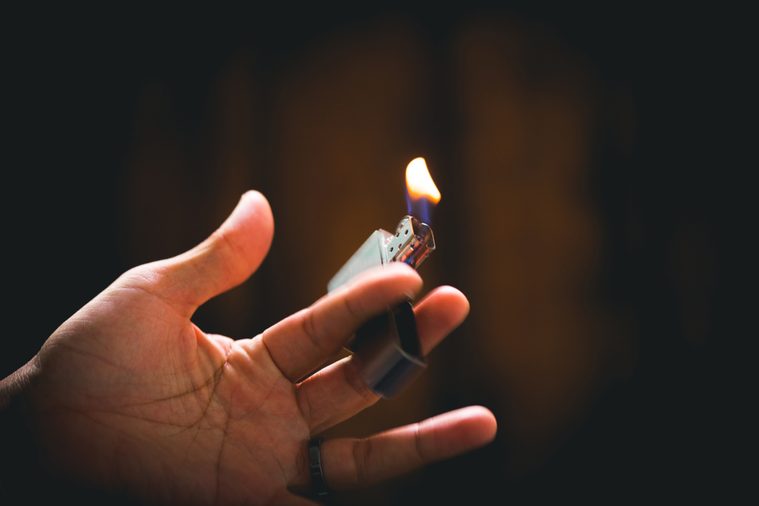
Avoid lighter fluid
While it might seem like a great idea to spray your charcoal with lighter fluid to get that fire going, Weber’s Grilling Guide for Charcoal Grills recommends avoiding it. Lighter fluid can adversely flavor your food and potentially be a fire hazard. Chimney starters and lighter cubes are more effective and cleaner ways to light your charcoal as per Weber.
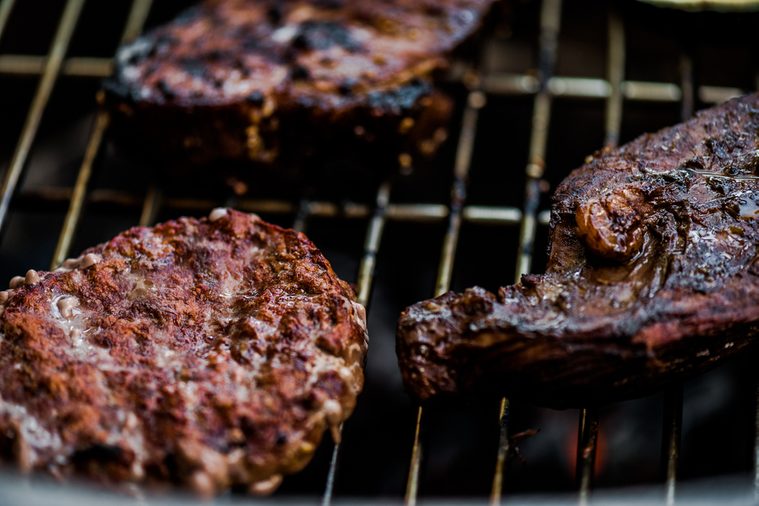
Don’t char your food
When the meat is cooked at high temperatures, as can be the case with grilling and charbroiling, high levels of carcinogenic compounds may form, according to the National Cancer Institute. And there’s evidence that these chemicals may contribute to an increased risk for cancer, according to research in the Journal Environmental International. The American Institute for Cancer Research recommends precooking meat briefly in the microwave and using a marinade to reduce levels of carcinogenic compounds.
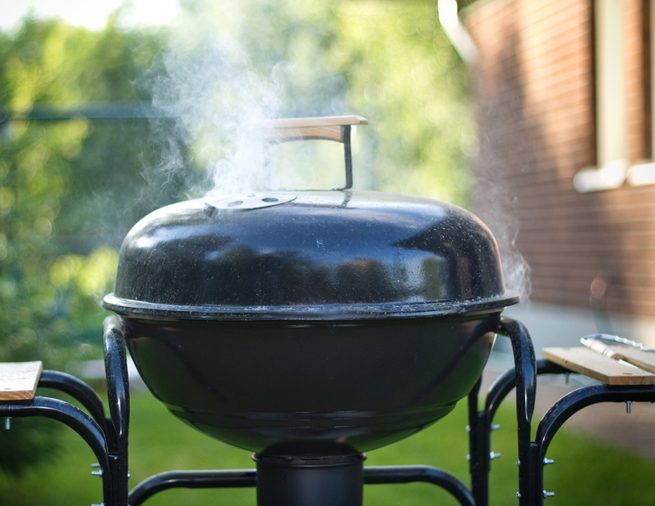
Prevent grill flare-ups
Weber’s Tips and Tricks for Grilling Success recommends keeping the lid closed to allow the grate to get hot enough to sear the food. It helps speed up the cooking time to prevent the food from drying out and traps the smoky flavor that develops when fat and juices vaporize in the grill. It can also help prevent flare-ups by limiting the amount of oxygen available. If a flare-up happens, move your food away from the direct heat until the flame dies down. Keeping the cover closed is also important for getting your food to a safe internal temperature.
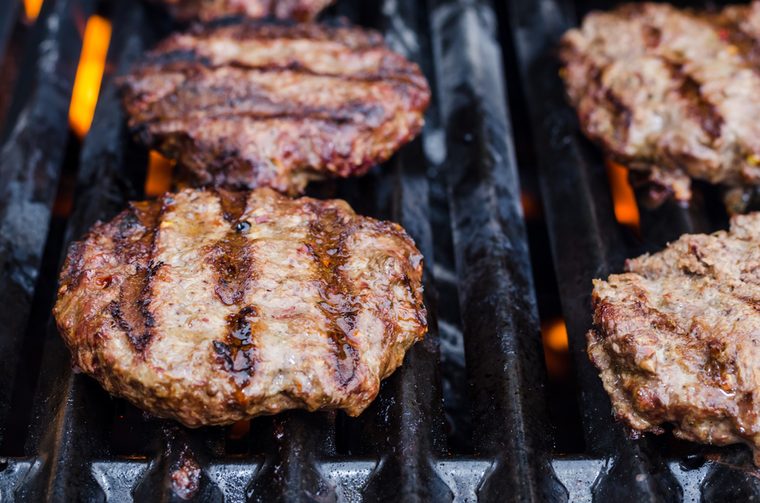
Use higher-fat meat
If you’re using 93 to 95 percent lean ground beef, it’s more likely that you will get a dry hamburger as there’s just not enough fat in the meat to keep the patties moist. That doesn’t mean you have to get full-fat meat. Instead, add grated apple or zucchini, salsa or relish or diced onion to your burger. For a plain juicy hamburger, it’s best to use higher-fat meat such as 80 to 85 percent lean or a combination of different meats such as lean beef mixed with ground brisket, bacon, or pork.
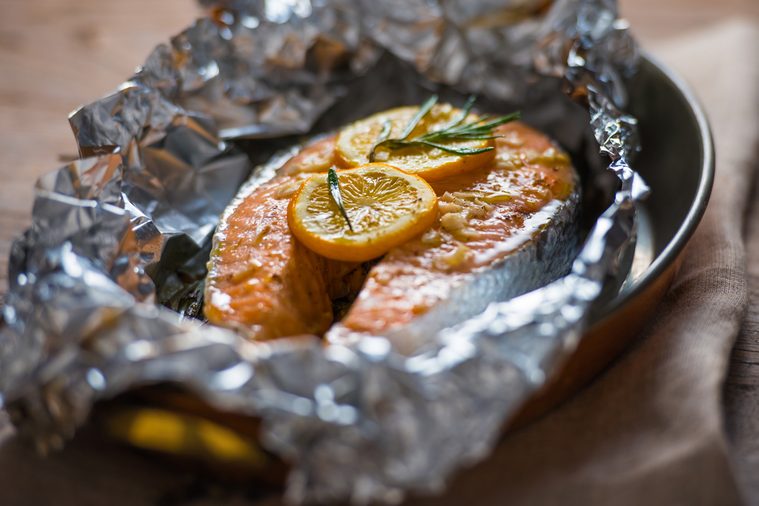
Use foil packets
“Tucking a mix of ingredients and seasonings into a foil packet is one of my favorite ways to grill,” says healthy cooking expert Julie Hartigan of the blog Cooking W/Julie. “They’re easy to assemble ahead of time in a variety of flavors and combos—just label with a sharpie—and are perfect for lighter healthier foods like fish and veggies. As a bonus, they’re non-stick too, for easy clean-up!” For dessert, Hartigan recommends making grilled fruit such as peaches or apricots. “Grilled s’mores work well in foil packets too, she adds. “Just be sure to use heavy-duty foil to avoid tearing!”
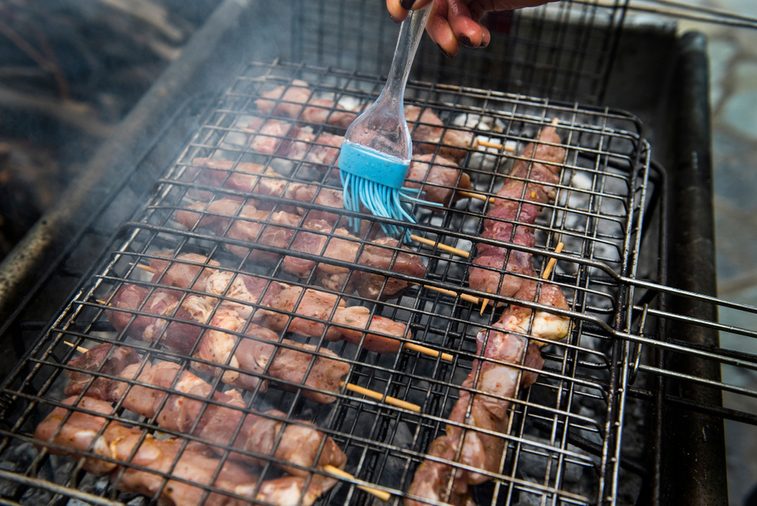
Oil the meat instead of the grate
It’s common for people to spray the grate with cooking spray to help prevent sticking, but you risk causing flare-ups and potential burns. Sprays can contain propellants that promote flare-ups, putting you at risk for burns. Also, the high heat in preheating causes the oil to reach its smoke point too early. Instead, oil your meat before you put it on the grill. If you must slick up the grill grates, wipe them with a folded paper towel that’s been dipped in oil or use an oil mister with your own oil.